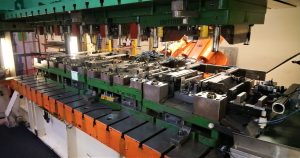
Irish Pressings bring prestigious Engineering Team of the Year Award home to West Donegal
2020 has begun in award-winning style for Irish Pressings Ltd. who picked up the Engineering Team of the Year Award at the
The past 12-months have been extremely tough for the automotive industry with headwinds apparently coming at manufacturers and the extended supply-chain from all angles.
While the effects of Brexit have already been severely felt (despite what some of the OEMs leaving the UK might say!!), could it possibly be that Brexit’s biggest impact will be that it distracted the UK automotive industry from the urgency required to facilitate the transition away from traditional vehicle design and manufacture towards a lightweight, high-tech vehicle of the future?
This came to mind when reading a recent article in the Autonews publication. The article – titled “Twilight of the Combustion Engine comes for Germany” – offered a fascinating insight into the scale and speed of transition in the automotive industry.
The article seeks to emphasise the scale of the challenge ahead and makes reference to Volkswagen’s efforts to accelerate the industry’s biggest electric-car rollout in an effort to make up 40% of sales by 2030, from a starting point of less than 1% in 2018 – even including plug-in hybrids in that total.
“Three VW plants in Germany are set to retool to only make battery cars. The cost of transforming just one plant over the next two years? At least €1.2 billion” the article continued.
Three plants, €1.2bn per plant, over the next two years. Even by my questionable maths that is one company alone investing €3.6bn in the next two years as part of the transition to an EV future!!
This amount dwarfs the sporadic investment announcements coming from UK-based OEMs regarding the transition away from the traditional combustion engine.
By 2030 countries including Denmark, Sweden, Norway, Ireland, the Netherlands, India, and cities including Barcelona, Vancouver, Seattle, Milan and London will all have banned the sale of new fossil-fuelled (petrol or diesel) vehicles. By 2040, this will extend to include huge automotive markets including France, the UK and China. These aren’t merely political commitments, but rather these commitments have been signed into law. This transition is happening, it’s happening right now and the automotive manufacturers and their supply chains need to act immediately to be a part of the future industry.
While the amazing amount of work going on in the areas of battery design, software development, autonomous vehicles, etc. must be acknowledged, there must be a concern that the employment-heavy car-manufacturing and assembly elements of the UK-industry could be left behind its international neighbours who appear to be moving much faster in making the “transition” a reality.
The immediate Brexit challenges must be faced, but not at the detriment to the long-term future of the industry. We must all be #futureready, not just #brexitready.

2020 has begun in award-winning style for Irish Pressings Ltd. who picked up the Engineering Team of the Year Award at the

Irish Pressings has recently been shortlisted as a finalist in the “Engineering Manufacturing Team of the Year – 2020” category at the

September can be a funny old month for students. Summer parties and coming home after sunrise have given way to early mornings